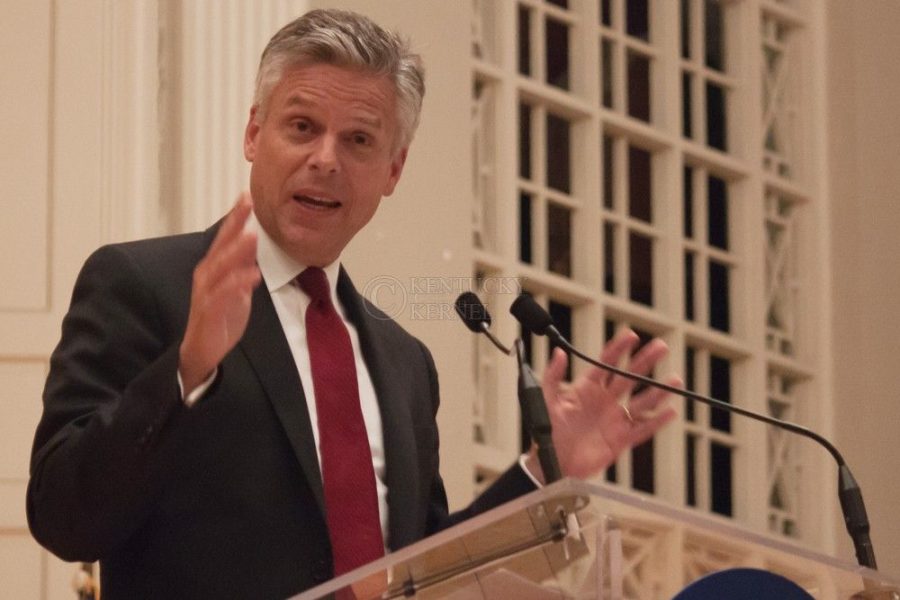Jon Huntsman speaks of Chinese relations, technological advancements
Former Utah Governor Jon Huntsman gives his speech on the topic of China at Memorial Hall in Lexington, Ky., on Thursday, February 20, 2014. Photo by Marcus Dorsey
February 21, 2014
By Becca Clemons
For a speech billed as a discussion of the China and its relationship with the United States, a surprising sound rang across a capacity crowd Thursday at Memorial Hall: laughter.
Jon Huntsman, a former governor of Utah, presidential candidate, and ambassador to China and Singapore, shared stories about the 2012 campaign, lectured millennials about making a difference and even name-dropped a storied campus restaurant before turning to his more serious scheduled topic.
“It’s an honor to be with all of you here who are coming from Tolly-Ho or wherever else out there tonight,” Huntsman said in his opening remarks, “thinking about horse racing and bourbon; but never mix the two, they say.”
He drew the most laughs while discussing his presidential campaign, where he ran in the 2012 Republican primary.
“For those of you who’ve never run for president before,” he said, “it is an awesome, intimidating, daunting experience.”
He joked about getting compliments from Michael Moore, the liberal documentary filmmaker, and former President Bill Clinton, saying they referred to him as “a Republican I could support one of these days.” Shortly after those pseudo-endorsements, he said, his primary numbers in Iowa and South Carolina plummeted.
On a more serious note, Huntsman did what he called “a little bit of political sermonizing” about dysfunction in Washington fueled by extreme partisanship, legislative districts drawn along party lines and campaign finance rules that are “an abomination.”
“We’ve gotta somehow rebuild in this country an ethos of problem-solving,” he said, “because right now, people don’t solve problems anymore; they create them, but they don’t solve them. And I’m not sure we even remember how to do deals anymore on Capitol Hill.”
However, he directed a refrain at the younger generation attending the speech: “Don’t get cynical.”
“There’s nothing wrong today in our country that can’t be fixed by you,” he told students.
Huntsman also addressed students in his talk about China, saying they needed to understand the politics, economics, culture and languages of other countries.
“I can tell you having been around so many universities in China … that your peers and your contemporaries are doing a very good job learning about this country,” he said. “The English is flawless, and the knowledge of our political system is truly, truly impressive.
“I come back here and I say, ‘I want the same thing for our students.’”
UK President Eli Capilouto echoed that sentiment in his introduction of Huntsman.
“As these boundaries that separate us become more permeable, higher education in general and the University of Kentucky must respond,” Capilouto said. “No longer do our graduates compete against degree holders in our state, or even in our country.”
Capilouto also stressed the potential for global partnerships on campus. Huntsman’s talk was sponsored by UK’s International Center, the Office of the President and the Confucius Institute.
The advances in technology over the next century will make the biggest mark in history books, Huntsman said. The changes in China over that time period, in terms of its trade policies, leadership changes, and urbanization challenges, will be important to watch in the immediate years to come, he said.
But the ability to communicate easily worldwide makes the world drastically different today than in past generations, Huntsman said.
He said his 14-year-old daughter, who was adopted from China, has the ability to talk to her friends in Beijing “seamlessly” through Skype and other technologies.
“My generation had barriers,” he said.
“Technology will continue to bring about some transitional changes that today we can’t even foresee.”


























































































































































